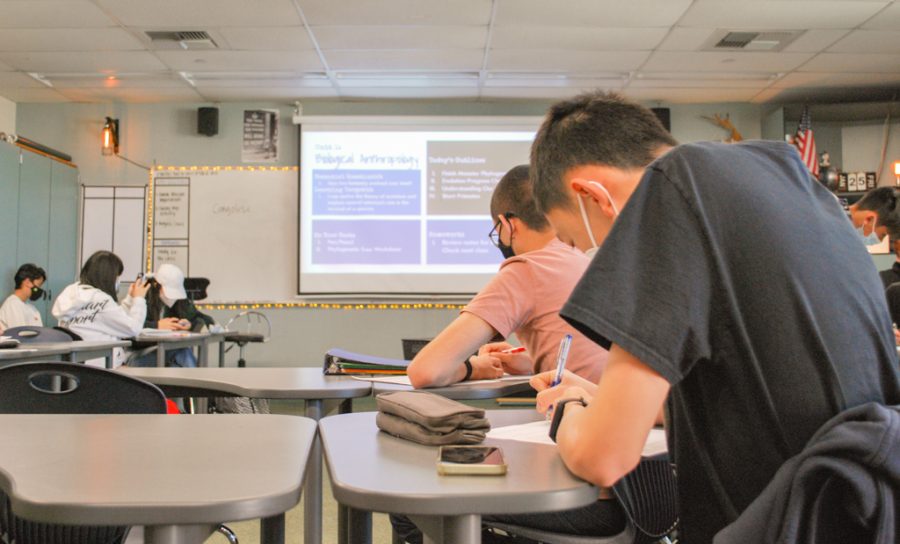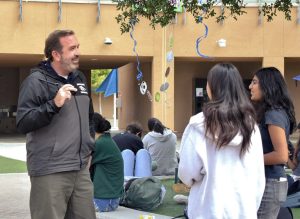CA AB 130 lowers education quality
LARGE PRICE TO PAY: CA AB 130 forces school districts to choose between moving to distance learning and decreased funding.
February 10, 2022
When Northwood students returned from winter break, many were caught off guard by the impact of the sudden surge in COVID-19 cases that had occured in the span of two weeks. Despite these circumstances, many California school districts continued to stay open rather than moving to a distance learning model, which comes with the risk of decreased state funding as established in the California Assembly Bill 130. Although CA AB 130 is intended to maintain valuable in-person instruction, decreasing funding for schools that transition to a virtual format limits the capability of school districts to accommodate the needs of their students, resulting in a lowered quality of education.
As of Jan. 31, Northwood reported 42 new cases from students and eight new cases from staff in the past 14 days. Following a winter break with increased travel by students and staff compounded by the rise of the omicron variant in the United States, high numbers of infections and quarantines should not come as a surprise. Omicron was initially highly transmissible even among fully vaccinated individuals, and for many students, the rising cases only added to existing COVID-19 anxiety.
“Coming back from winter break was probably the most nerve-wracking experience I’ve had in regards to COVID-19,” junior Sana Hamid said. “I’m not the type of student to treat attendance lightly, but the urgency of the situation resulted in me skipping school frequently. Both of my parents are auto-immune compromised, which puts them in the high risk category, so I felt that the most responsible action I could take was to avoid contracting the virus.”
The ideal solution would have been to shift to remote-learning following winter break to allow individuals to quarantine at home, much the way UCLA and UCI, as well as other neighboring colleges, did. Unfortunately, revisions to CA AB 130 prevent schools from transitioning online at the discretion of district staff. Control over learning models was instead placed in the hands of the California government, when the decision should have been left in the hands of local leaders.
Under the revised bill, school districts are allowed to offer a separate, virtual educational program in addition to the in-person learning model, but a school district cannot decide to switch its in-personal program temporarily to remote learning without facing repercussions in the form of decreased funding. For many districts who are unwilling to forgo limited funding in exchange for virtual learning, this leaves no choice for students but to continue attending school as usual. As the pandemic continues to evolve, the unfavorable situation created by CA AB 130 clearly does not provide peace of mind for students, staff and parents who may feel uncomfortable attending school.
The ability to offer collaboration is difficult to replicate online, so it cannot be denied that in-person education is a valuable asset to student growth. However, the main problem with the revisions to CA AB 130 is that it takes away choice from students and their families. Though the bill intends to enhance learning by encouraging school districts to remain open, for students who may have contracted COVID-19 or been a close contact, the lack of virtual learning leaves many students in the dark as they quarantine.
What’s clear is this: The revisions to CA AB 130 overlook many difficulties school districts may encounter based on the needs of the communities they serve. By limiting the ability of schools to transition online as needed, the bill ends up hurting the very students it is intended to benefit. In times when new variants are still frequently emerging, it is more essential than ever that we learn from our failures in combating COVID-19 sooner rather than later.



![AAAAAND ANOTHER THING: [CENSORED] [REDACTED] [BABY SCREAMING] [SIRENS] [SILENCE].](https://thehowleronline.org/wp-content/uploads/2025/06/lucy-1200x800.jpg)





















































![AAAAAND ANOTHER THING: [CENSORED] [REDACTED] [BABY SCREAMING] [SIRENS] [SILENCE].](https://thehowleronline.org/wp-content/uploads/2025/06/lucy-300x200.jpg)
